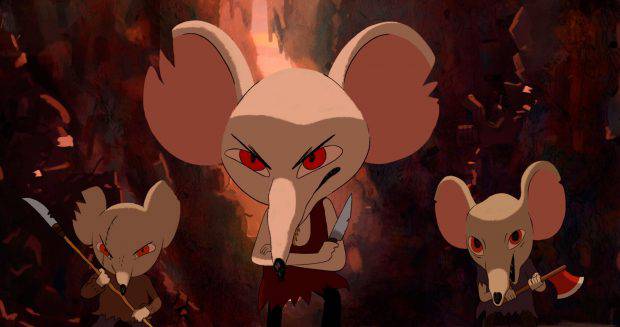‘Psychonauts, the Forgotten Children’ review
Among the Official Features Selection of this year’s Annecy festival is Pedro Rivero and Alberto Vázquez’s Psychonauts, The Forgotten Children (Psiconautas, los niños olvidados). Adapted from Vázquez’s independent graphic novel Psiconautas, the film is a feature-length outing for the characters of the duo’s 2010 short film Birdboy (which itself screened at Annecy in 2011) and has already made some industry waves, winning the award for Best Animated Feature at both Golden Kuker-Sofia and the Stuttgart Festival of Animated Film earlier this year.
The look of the film is immediately a step above that of the original short film, exchanging the tween-heavy asset-based 2D character animation with full animation rendered in a Tove Jansson-esque line style. In several respects the approach to the film from both a design and storytelling perspective has absorbed much from Vázquez’s interim venture Unicorn Blood (2013). While the backgrounds and environments retain to some extent the same painterly aesthetic as the short (a perpetually overcast world where trees worm out of the ground like exposed, splayed nerve endings), the character designs themselves are more evolved, rougher around the edges and less evocative of mid-afternoon CBeebies fare. While this first approach was more strongly juxtaposed against the original short’s not-so-cheery themes of death and isolation, it’s clear from the get go that such a device would be superfluous in Psychonauts, where a palpable sense of unease is present from its first minute.
The original short serves as a prelude to the film and tells of the ostracized, substance-dependent Birdboy (a…well, a bird-boy) who lives a grim life on the outskirts of society, hunted by officials and feared by all except the recently-orphaned mouse Dinky, with whom he has shaky romance. In Psychonauts Dinky resolves to escape from her adopted family and the miserable island on which they live, with the aid of classmates Sandra (a rabbit tormented by schizophrenic impulses) and Little Fox. Robbing a local drug dealer, the trio set off together while Dinky nurtures the hope that the estranged Birdboy may join them.
The story of Birdboy himself is expanded on, his would-be killers – a police official and his protégé – motivated by the misdeeds of his father. Other interwoven story strands include the forgotten children of the title, who present themselves as the most malicious and significant obstacle in the children’s journey to leave when they reach the island’s industrial zone; the bizarre dynamic of Dinky’s foster family, which includes her brother, a pug in wrestling garb; as well as a derelict father and son scavenging for survival among the island’s junkyards and the curiously tragic, inevitable outcome when they encounter a pair of rivals. Tragedy is indeed something of a common theme throughout, the residents of the island plagued by poverty and drug-fueled cacodemons that threaten to supplant them altogether (these spark some of the film’s more visually striking sequences, such as drug-dealer Zacharias’s emotionally-charged battle with the malevolent spider-creature that has possessed his ailing mother, as well as Birdboy’s confrontation with his own darker self at the lighthouse of his childhood)
It would be very easy for a film that indulges such strong themes of misery and arbitrary suffering to become interminable in the first act and struggle to sustain itself for the length of a feature. Fortunately the writers have the good sense to sprinkle it with moments of absurdist wit in both the visuals, dialogue and character concepts. These include Dinky’s sentient, co-dependent alarm clock in perpetual despair at the state of the world, an inflatable rubber duck dinghy with a tormented past and a philosophical piggy bank (“I feel so empty”, it ruminates with ennui once its contents are stolen). Even in its darker moments humour pokes through effectively; I’ll just leave the phrase “You made the baby Jesus doll cry blood!” here.
Though perhaps a victim of its own pacing at times, Psychonauts boasts enough fluidity of animation, richness of layout and genuinely enchanting visual concepts (not to mention a memorably atmospheric score by Aránzazu Calleja) to warrant special attention as a significant achievement for Spanish animated film.
English-subtitled screenings of Psychonauts, The Forgotten Children at Annecy 2016 will take place at:
- 14/06/2016 – 10:30, Bonlieu Grande salle
- 14/06/2016 – 17:00, Cinéma Pathé Pathé 2
- 16/06/2016 – 15:00, Cinéma Pathé Pathé 2
Visit the film’s official website at psiconautaslapelicula.com



